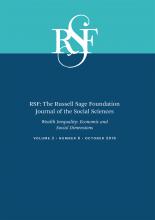Research Article
Open Access
Health Shocks and Social Drift: Examining the Relationship Between Acute Illness and Family Wealth
Jason Thompson, Dalton Conley
RSF: The Russell Sage Foundation Journal of the Social Sciences October 2016, 2 (6) 153-171; DOI: https://doi.org/10.7758/RSF.2016.2.6.08
Jason Thompson
aDoctoral candidate in sociology at New York University
Dalton Conley
bHenry Putnam University Professor of Sociology at Princeton University. He is also research associate at the National Bureau of Economic Research

REFERENCES
- ↵
- Adler, Nancy, and
- Joan Ostrove
- ↵
- Bibbins-Domingo, Kirsten,
- Mark J. Pletcher, ,
- Feng Lin, ,
- Eric Vittinghoff, ,
- Julius M. Gardin, ,
- Alexander Arynchyn, ,
- Cora E. Lewis, ,
- O. Dale Williams, , and
- Stephen B. Hulley
- ↵
- ↵
- Braveman, Paula A.,
- Catherine Cubbin, ,
- Susan Egerter, ,
- David R. Williams, , and
- Elsie Pamuk
- ↵
- Choi, HwaJung,
- Robert F. Schoeni, ,
- Kenneth M. Langa, , and
- Michele M. Heisler
- ↵
- Coile, Courtney, and
- Kevin Milligan
- ↵Conley, Dalton. 1999. Being Black, Living in the Red: Race, Wealth, and Social Policy in America. Berkeley: University of California Press.
- ↵
- Conley, Dalton, and
- Jason Thompson
- ↵
- ↵
- ↵
- Haas, Steven A
- ↵
- Hadley, Jack
- ↵
- Himmelstein, David U.,
- Elizabeth Warren, ,
- Deborah Thorne, , and
- Steffie Woolhandler
- ↵
- Himmelstein, David U.,
- Elizabeth Warren, ,
- Deborah Thorne, , and
- Steffie Woolhandler
- ↵
- Keister, Lisa A
- ↵
- Keister, Lisa A., and
- Stephanie Moller
- ↵
- Krivo, Lauren J., and
- Robert L. Kaufman
- ↵
- Lang, Thierry,
- Benoit Lepage, ,
- Anne-Cécile Schieber, ,
- Sébastien Lamy, , and
- Michelle Kelly-Irving
- ↵
- Link, Bruce G., and
- Jo Phelan
- ↵
- ↵Oliver, Melvin, and Thomas Shapiro. 1995. Black Wealth/White Wealth: A New Perspective on Racial Inequality. New York: Routledge.
- ↵
- ↵Poterba, James, Steven Venti, and David Wise. 2010. “The Asset Cost of Poor Health.” NBER working paper series no. 16389. Cambridge, Mass.: National Bureau of Economic Research.
- ↵
- Ross, Catherine E., and
- Chia-ling Wu
- ↵
- Siegel, Rebecca,
- Deepa Naishadham, , and
- Ahmedin Jemal
- ↵
- ↵Smith, James P. 2001. “Why Is Wealth Inequality Rising?” In The Causes and Consequences of Increasing Inequality, edited by Finis Welch. Chicago: University of Chicago Press.
- ↵
- Smith, James P
- ↵Thompson, Jeffrey P., and Gustavo A. Suarez. 2015. “Exploring the Racial Wealth Gap Using the Survey of Consumer Finances.” FEDS working paper no. 2015-76. Washington: Federal Reserve System. doi: 10.17016/FEDS.2015.076.
- ↵
- Williams, David R., and
- Chiquita Collins
- ↵
- Williams, David R., and
- Pamela B. Jackson
- ↵
- Williams, David R.,
- Selina A. Mohammed, ,
- Jacinta Leavell, , and
- Chiquita Collins
- ↵
- ↵
- Wu, Stephen
- ↵
- Zajacova, Anna,
- Jennifer B. Dowd, ,
- Robert F. Schoeni, , and
- Robert B. Wallace
In this issue
Health Shocks and Social Drift: Examining the Relationship Between Acute Illness and Family Wealth
Jason Thompson, Dalton Conley
RSF: The Russell Sage Foundation Journal of the Social Sciences Oct 2016, 2 (6) 153-171; DOI: 10.7758/RSF.2016.2.6.08
Jump to section
Related Articles
- No related articles found.
Cited By...
- No citing articles found.





